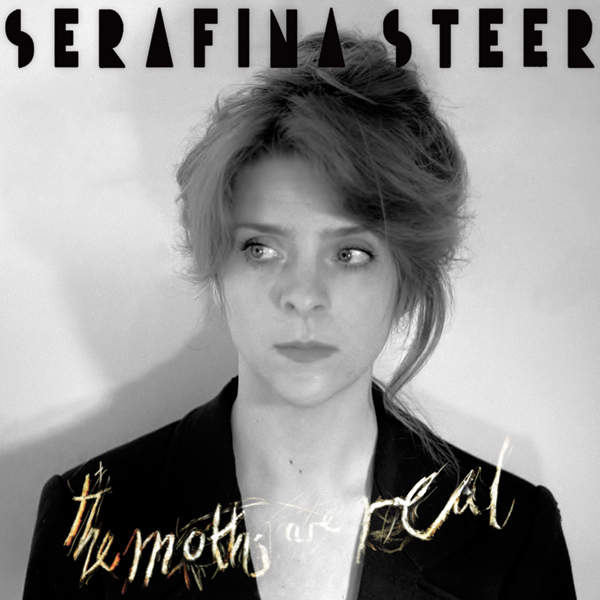Friday, 8 February 2013
Album Review: Serafina Steer - The Moths Are Real
In the video for "Island Odessy", the second single to be released in conjunction with The Moths Are Real, we see Serafina Steer on sun-glared beaches and in uninhabited coastal woods. The setting for this video shoot is not immediately apparent, but although there are shots of exotic-looking flora and fauna, I suspect that on this occasion she hasn't actually travelled beyond the British Isles. Sometimes we forget how strange and adaptive our home can be. The story of Britain is in itself an island odessy, which Serafina and her collaborators have expressed superbly on this new album.
The second-in-command cultural ambassador for The Moths Are Real may not be of a huge surprise to those in the know. Jarvis Cocker, who has apparently been waxing lyrical about the previous Serafina album Change Is Good, Change Is Good on his BBC Radio 6 show, takes the helm as the album's chief producer, also astonishingly his first role in the seat. However no-one comes across as a novice here; The Moths Are Real shines with confidence and sophistication, not least in Serafina's yarn-spun quests. Creating vivid locations appears to be one of her many fortes, whether it be the curiously attractive return to the street in "The Ballad Of Brick Lane", or the transformative whirring of "The Machine Room", which the narrator wishes to appease "in my boiler suit and hard hat", Serafina reveals her thoughtful character differently to these musical and thematic settings.
In addition to Cocker and roster of guests (fellow Pulp-man Steve Mackay, Polar Bear's Seb Rochford, Capitol K, David Cunningham and Simon Bookish), there are at least two other qualities Serafina possesses to boost the quality of The Moths Are Real. Her voice is one of them, and perhaps most significant. It darts between her harp (the other, more on that soon) and additional instrumentation as an extension to her often knotty and perplexing storytelling and enables her to surpass twee with a definite poise and latent sensuality. Consider "Skinny Dipping", which counterbalances the perversity of sneaking a glimpse at her fellow swimmer with a delicacy, even beauty. Or the following "The Removal Man", who Serafina scolds as he "called my cathedral a chapel", adding the baffling but not inappropriate "my removed patch, my arse" as a kiss-off. Jarvis's recognisable baritone adds to the mockery of the situation; they equally seem glad to be rid of him. Or better still the opener "Night Before Mutiny", which tells the story of departing seamen from the potent female perspective. The melancholic humour of The Moths Are Real may be expressed most perfectly here. "I kissed the captain but the cabin boy / Was the one that did it for me".
If not the voice, the predominant instrument on The Moths Are Real is the harp. Serafina's playing (do not file next to Joanna Newsom) is usually as tart and piquant as her lyrics, existing somewhere between functunal and elaborate. I'd say it gives the album evidence towards the idea of an instrument being an extension of its musician, captivating right from its opening notes. Serafina takes her harp to places it doesn't seem to have fit before, and bizzarely manages to make it work every time. In the "Machine Room" it feels airy when hovering over its rugged electronic drumbeat companion. It can signify an alien invasion in the song bearing the same name, giving an alternate soundtrack to English science fiction literature. And in "Disco Compilation", possibly the best thing here, it introduces the loneliness of the celebratory dancefloor not heard since Robyn's "Dancing On My Own". Jarvis's mix swells in a house beat and trumpet fanfare until the song is overwhelmed completely. He should be doing this more often.
Call it the real deal, or a complete package, or whatever you like; The Moths Are Real is the first great album of 2013. It has the personality and wit for the folkies, but the forefronted leftfield influences will likely keep the non-folkies interested in at least a few places. The title track serves as the album's closer, a beautiful piece of chamber-pop that shows the sweetness of Serafina's music's simplicity; a simplicity that's brave enough to keep the door ajar for any odessy.
"Feels like... a moth... to the light..."
Subscribe to:
Post Comments (Atom)


No comments:
Post a Comment